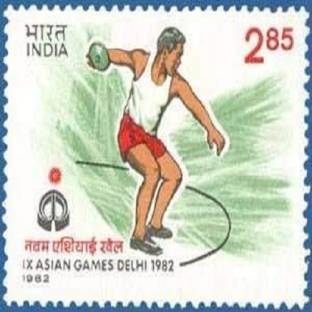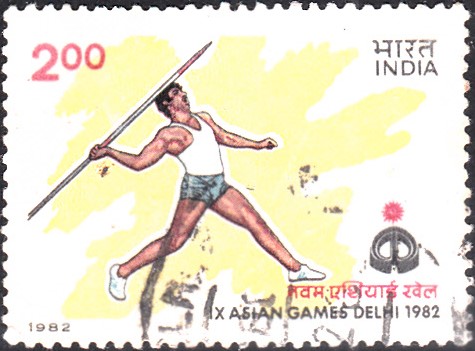The exposure to diverse fields of knowledge created a sense of importance and self-worth in the staff; they realised they were being addressed by eminent people, who they would never have got a chance to listen to in normal circumstances.
Leadership is unlocking peoples’ potential to become better.
Bill Bradley, former US Senator
Having done a successful stint in Kota, I was called to Delhi to take charge as Officer on Special Duty (OSD) for providing postal services for the IXth Asian Games, 1982, which were just six months away. Several Division Heads in the Delhi Circle were looking forward to being entrusted with the prestigious assignment, which eventually was given to me. Since this was a short-term project, there was no special recruitment and I was assigned a staff of about one hundred men and women from the existing Divisions in Delhi. The unhappy Division Heads got back at me by offering me the worst staff they had. These were employees known to be undisciplined, shirkers and even mischief makers. So here I had one hundred of the most notorious employees, a tough deadline to meet and the question of not just the department’s but the nation’s prestige at stake.
Handling the creation of infrastructure was relatively easy and with full support of my Circle officers and utmost cooperation of the architects and engineers we made good progress. Scientific project management tools like CPM and PERT were applied to closely monitor the project. Besides modern interiors and furniture, innovative display devices were used to showcase stamps and other philatelic material depicting India’s culture, history and architecture. Special Letter Boxes were designed in the shape of the Sun Dial at Delhi’s Jantar Mantar, which was also the logo of the Games. Post offices and extension counters required for the athletes and officials were established at all the venues for the Games.
The real challenge was to bring my staff of one hundred—quite literally my dirty dozen—up to the desired expectations of proficiency and motivation. I had my first meeting with the staff where I talked only about the significance of the project we were entrusted with and how the fair name of the Department depended on how well all of us discharged our duties. In a forthright manner I demanded absolute commitment and sincerity, made no promises on working conditions and asked anyone who had misgivings to opt out at that stage itself. No one did.
I now started with their training. Refresher classes were held on postal rules and procedures to clarify any doubts. I then invited highly placed officers from the Ministries of Sports, Youth Affairs etc., to talk to the employees about the larger picture of the Games and the massive effort that was going on to make them a success. I got senior officers from the Department of Tourism, Ministry of Culture, Civil Aviation, Railways, DTC etc., to talk to them about questions that the athletes and their managers might have about India. I even got senior professors from the Faculty of Management Studies, Delhi University to talk to the staff about sophisticated topics like motivation theories, transactional analysis and anger management, etc. I had to choose the subjects carefully and convince my staff that they needed to absorb all that was being discussed to become the country’s face to the world for the two-week duration of the Games. All training sessions were held at the Nehru Yuvak Kendra, in Chanakyapuri to create an atmosphere of professionalism, beyond the limits of the Department. Remember, the staff were ordinary postal clerks and supervisors, most of them simple graduates with average family backgrounds.
The exposure to diverse fields of knowledge created a sense of importance and self-worth in the staff; they realised they were being addressed by eminent people, who they would never have got a chance to listen to in normal circumstances. I even had exponents of Indian dances, sculpture, architecture and painting to address them. The post offices were being readied while my staff was undergoing this unorthodox training. I had, in the meantime, also built a healthy relationship with the Division Heads, who slowly came on board and gave me the external support I needed to run the Games offices within the larger postal system. The Games administrators, who were sceptical about the quality and presentation of our offices, were so impressed with what we were setting up that other departments were advised to follow our standards of perfection.
The Games came, and the staff performed far beyond anyone’s expectations. Post offices became the meeting places for the young athletes, where they gathered after dinner, received mails, wrote letters to their families, exchanged notes on travel plans and interacted with our staff on Indian dances, culture and travel destinations. ITDC travel brochures, daily newspapers and bulletins of the Games authorities were kept available at the post offices, which became popular meeting places and miniature social hubs after dinner. The post offices remained open till late in the night and none of the staff complained. They were feeling important, they knew where they fitted into the whole scheme of the Games, they had been provided with all the information and skills to handle the job, they were enjoying the attention of the athletes and were thrilled that they were being looked up to as knowledgeable people, who could answer practically all queries of the athletes, their managers and official delegates.
The Postal Department being what it was at that time, forget any cash incentives, I was not even able to promise uniforms to my staff, which I would have liked to do. We could not provide them transport and they managed to create vehicle pools amongst themselves. Remember the Games were spread all over Delhi and India and my special cell was responsible for postal arrangements at all the sporting and residential venues. At the end of the Games, apart from fond farewell visits from the athletes, we got commendation letters from the Prime Minister, Minister, Secretary of the Ministry of Communications, Chairman of the Special Organising Committee (SOC) and many others. A permanent recognition of our work is the collection of postal items, including the Sun Dial Letter Box, which are part of the IX Asiad memorabilia on display at an exhibition set up by the Sports Authority of India, at the Jawahar Lal Nehru stadium in Delhi.
The so-called worst staff had performed like a dream.
I am sure you have realised how this miracle took place.
Yes, there are lessons here:
i. Training, apart from knowledge and skills, imparts self worth;
ii. Giving employees a feel of the larger picture and where their role fits in is very important;
ii. Motivation can be non-monetary;
iv. Disgruntled colleagues should be co-opted as you may need their support to achieve your objectives;
v. Working on the strengths of your employees is more important than focusing on their shortcomings; and
vi. The native intelligence of the average employee should never be underestimated.
Arvind Saxena is an Indian civil servant and a former Chairman of the Union Public Service Commission (UPSC). A 1978-batch Civil Services officer, he served in the Indian Postal Service for ten years, before joining the Research and Analysis Wing (R&AW) of the Cabinet Secretariat, in 1988. After retirement from government, he joined the UPSC in May 2015.

